Table of Contents
Introduction
Here at Puget Systems, specifically in the Labs department, most of the content that we write falls into one of two categories: either long, fairly in-depth articles looking at the performance of various PC components in a given application or recommended system pages, with multiple configuration options aimed at different budgets and lots of supporting data drawn from the aforementioned articles. For some readers, all of that is information overload, though, and they just want a quick question answered: what is the best computer for my needs? We’re going to try answering that question more directly in a new series of short articles, like this one.
Today we are looking at SOLIDWORKS, a multi-function engineering program from Dassault Systemes. It uses the CPU for most of the heavy lifting, with general modeling benefiting primarily from clock speed while rendering and some types of simulation can utilize multiple cores effectively. The video card is also critical, as it impacts the smoothness of manipulating parts and assemblies.
Because of the variance in CPU usage depending on workload, this article will start with a general-usage SOLIDWORKS configuration but then split up and offer separate recommendations for the best modeling and simulation workstations.
Screenshot of SOLIDWORKS 2020
Good PC Configuration for SOLIDWORKS
We'll start off with a good, solid workstation design for SOLIDWORKS – without too high of a price tag. This application performs best with a CPU that has a high clock speed, with little regard to core count, which means that Intel's latest Core 10th Generation processors do very well here. The Core i7 10700K is a solid choice, and pairing it with 32GB of memory will exceed the recommendation for this program. Likewise, a Quadro RTX 4000 is more than fast enough for most workloads while sticking with a certified video card from NVIDIA's professional-grade line. A fast 1TB SSD will ensure that the system is responsive and offers a solid amount of storage space.
| CPU | Intel Core i7 10700K 8-core |
| Video Cards | NVIDIA Quadro RTX 4000 8GB |
| RAM | 32GB DDR4 |
| Drives | 1TB NVMe SSD |
Configure System With These Specs
Best PC Configuration for SOLIDWORKS Modeling
Stepping up from there, for the modeling-focused engineer, we can move up to the Intel Core i9 10900K with a slightly higher clock speed and a couple of additional cores. Upgrading to the more powerful Quadro RTX 6000 while doubling the RAM and storage capacity are all solid upgrades as well. To protect this investment, increasing the parts warranty length is a good idea too.
| CPU | Intel Core i9 10900K 10-core |
| Video Cards | NVIDIA Quadro RTX 6000 24GB |
| RAM | 64GB DDR4 |
| Drives | 2 x 1TB NVMe SSDs |
Configure System With These Specs
Best PC Configuration for SOLIDWORKS Simulation
For those working more on the simulation side of things, a different approach is best. Clock speed still matters a lot here, but so does thread count – so we move up to Intel's Core i9 10980XE with 18 cores. RAM and storage capacity are both increased relative to the modeling system as well, but the video card is kept the same (and is likely even overkill in this role for most users). All of this requires a larger, tower-style chassis as well.
| CPU | Intel Core i9 10980XE 18-core |
| Video Cards | NVIDIA Quadro RTX 6000 24GB |
| RAM | 256GB DDR4 |
| Drives | 1TB & 2TB NVMe SSDs |
Configure System With These Specs
Please note that none of these designs are specifically tailored for rendering – either with Photoview 360 or Visualize. If your workflow involves a lot of that, consider one of our rendering-optimized systems instead.
Additional Resources
If you want to know more about SOLIDWORKS performance, we have published several articles over the years looking at how various CPUs and video cards compare in a wide range of professional programs. And if you aren’t sure what you need, or if your workflow includes multiple applications, please feel free to call or email our consultants to get a more personalized configuration.
Puget Systems offers a range of powerful and reliable systems that are tailor-made for your unique workflow.

